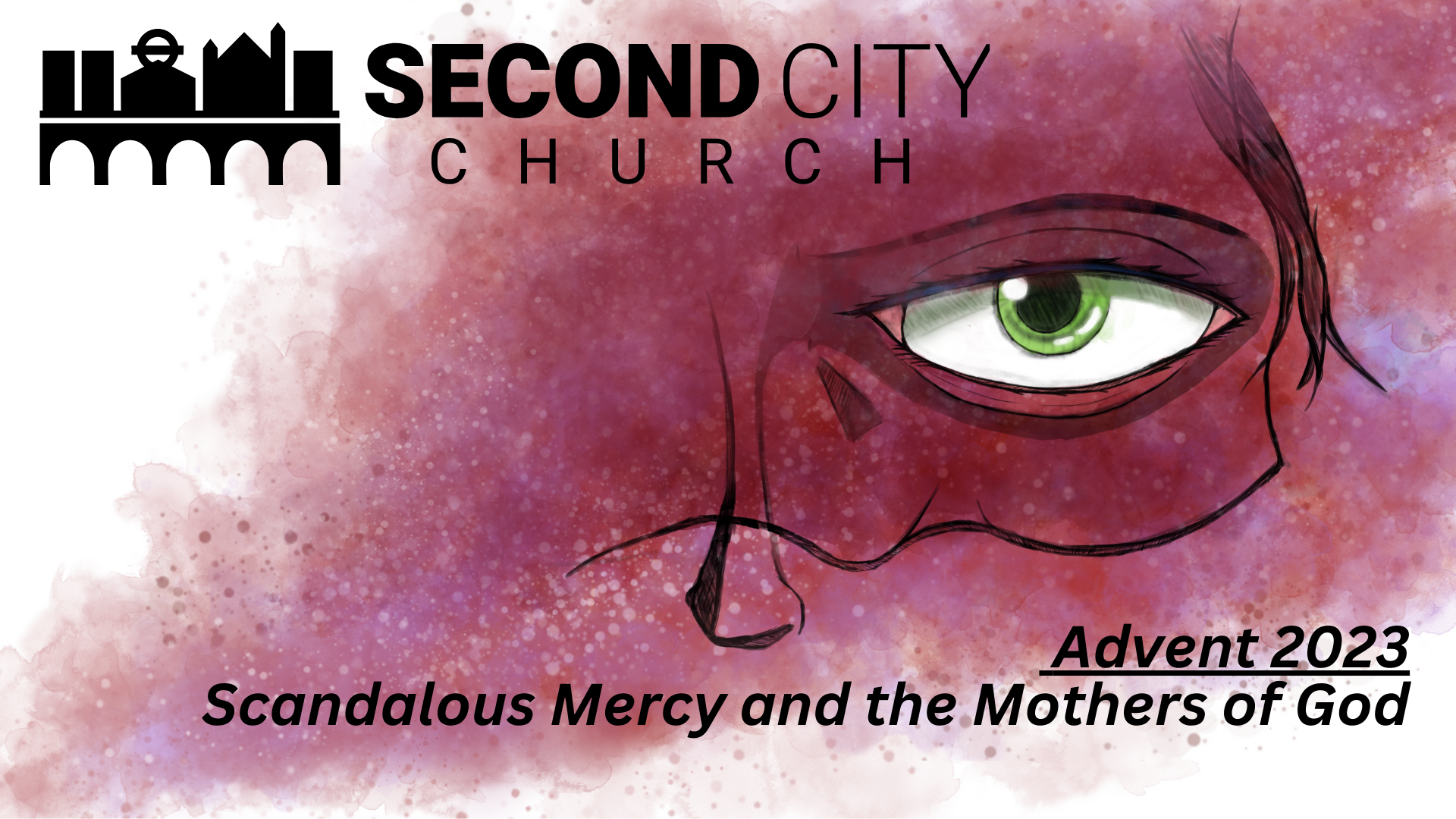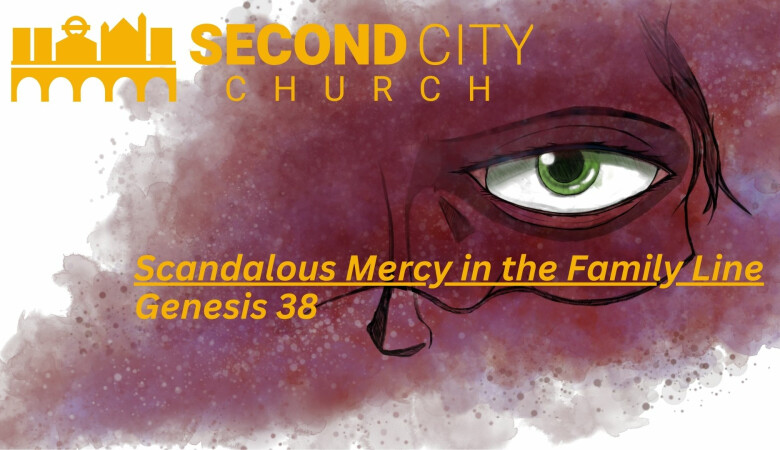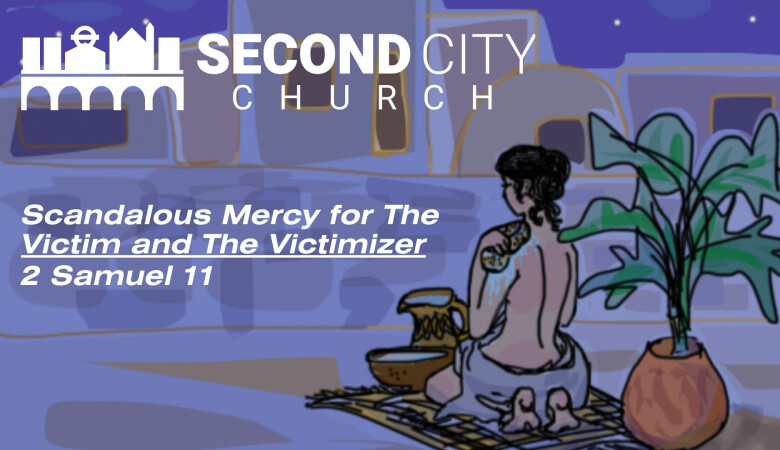Series: Advent 23: Scandalous Mercy and the Mothers of God
Mercy for the Barren
December 31, 2023 | Peter Rowan
Passage: Luke 1:5-25
ALL SERMONS IN SERIES
Summary
Transcript
Some of you have likely been to the great capital city of Ireland, Dublin. It’s a big tourist city, of course, and for many reasons. People go there for the Guinness brewery, or they go there to walk it’s beautiful streets and to go into its historic pubs and listen to great celtic music. One thing I think is kind of wild is that its biggest tourist attraction is actually its zoo. But what I don’t find surprising is that its second biggest attraction is the book of Kells. The book of Kells is a wonderfully ornamental-illustrated book of the gospel texts. Maybe some of you have looked through our gospel book that is read in the middle of our congregation each week. That was done by the remarkable contemporary christian artist, Mako Fujimura. The book of Kells is without questions the most famous illustrated gospel text and it dates to around 800, which means it was written much more closely to the time of Jesus than to our own time. Well, I went and saw this famous text when I was in Ireland with a friend when I was in college. The book of Kells is in the library at Trinity College in the heart of Dublin and the people who put together the exhibit wisely lead you through the library and all of these other majestic old books and teach you about what you are about to see when you come to the book of Kells. So, when you arrive, you have learned about Celtic Christianity and about the monks who devoted their lives to the preservation and beautiful presentation of God’s Word. If you just went straight to the book of Kells and looked at it, you would certainly appreciate it, but not nearly, not even close, to the extent that you appreciate after learning how they made the colors and just how long it took to do one page and all of the rest.
We have been in this genealogy of Jesus in the book of Matthew look particularly at the women mentioned there and in some ways it really is just wild that the NT and the gospel writers don’t just jump right into Jesus. They are preparing us to receive him properly, they are not just doing history, they are doing theology.
Today we are going to look at another woman that comes before Jesus, his aunt Elizabeth. This story is found in the first chapter of Luke and Luke does something similar to what Matthew has done. In fact, Luke doesn’t mention Jesus until verse 31. Instead, Luke first tells us about the birth of John the Baptist and specifically about John’s parents, Zachariah and Elizabeth. Much of this story has to do with Zachariah and the angel meeting him in God’s house while he was serving him, but I want us to focus on Elizabeth here. What do we learn about Elizabeth and therefore how do we understand Jesus better?
Well, the first thing we learn is that she lived in the days of Herod, king of Judea. That might not mean much to us, but to them it was incredibly significant. Herod was a Roman ruler, which for any Jew then meant that things were not right. There should have been a descendent of David on the throne. But for a Jew who was really seeking God, that would have also brought back for them the reality of Israel sin, of their rebellion against God. But Herod represented more than just that. He was great leader, but he was also a terrible ruler. He got things done. He was known for his building projects. He expanded the temple in Jerusalem, but he also built many pagan temples in Judea. And, this is the Herod who order the slaughter of the boys 2 years and younger around Bethlehem.
So, Elizabeth lives in a time of upheaval, a time when sin has laid waste so many of the desires of her people. All around, you could look and see that the world is not right, that things aren’t as they should be. The rough places were really rough and the valleys, the low places were really low.
The next thing we learn about Elizabeth is that she was one of the daughters of Aaron. She came from a religious family. All Jews were inherently came from a religious family, but she came from the family of Aaron, the original chief priest. She was like a pastor kid, but like the OG pastor’s kid.
The third thing we learn about Elizabeth is that she was righteous before God. She was in a good standing with God, she was justified in his sight. This is rather significant. We know that there were plenty of priests and priest families then just like now who really don’t care about God. We know there were plenty of people then who were from religious families who just gave on it all, they thought it silly and a joke and gave up on it. They thought God was dead, or at least dead to them. But not Elizabeth. This who God thing was alive. She had a relationship with God.
And then we learn that out of that relationship with God, that righteousness, that ability to stand before him and stand with him, we read the she walked blamelessly in the commandments and statutes of the Lord. This is to say that her life bore the fruit of living with God. What we are to understand is that she isn’t faking it. This is a deeply devout woman, a woman who we ought all to seek to emulate in our lives. She knew the love of god and loved him and her life demonstrated that love.
Yet, here is the very next thing we learn about her: she had no child, because she was barren and she was old. It’s not that she didn’t have children because she didn’t want them. No, she couldn’t have them. She was barren. Barren.
Some of you know this state. Some of you have known the desire for children and it has gone unmet for your life. Some of you have known the desire for a spouse and it has gone unmet. My guess is that all of us can empathize on some level with Elizabeth. Things haven’t come together as we had hoped, or planned. Our desires, even our holy desires (weren’t we told to be fruitful and multiply?!), go unmet. We long to use our creativity for the blessing of others, but it seems to go nowhere. We want to work hard a work worth doing, but most of our job applications are rejected and so we settle for whatever we can get that will bring home the money needed to live. It’s December 31st. (It’s actually 12/31/23, which is 123,123) and so we make resolutions again, maybe to read more this year, to get in shape this year, to loose those pounds this year, to connect with friends more intentionally this yea, because we don’t want a barren mind, or body or heart. Barrenness. I looked up synonyms. Many of them seem to fit better when we talk about land. A dessert. Dry. Fallow. A waste land. And that’s how we feel. And that’s sometimes what we experience. Other synonyms: impoverished. Desolate. Empty. Parched. I have children and those words are not unfamiliar to me and I guarantee that they are not unfamiliar to you too.
And I want you to hear something significant in this passage, this is not because of some sin that Elizabeth is barren. There is no hint at that idea. There is the hint of the idea of Israel’s sin that has led to Herod’s rule, so we shouldn’t discount the idea that our sin does at times have dire consequences in this life, but much of the hardship of this life is simply the fact that things are not as they should be! The world is not right, “it groans to be set free from its bondage to corruption,” Paul tells us in Romans 8. And much of the hardship in your life, much of the barrenness that you experience and you feel is the ache of this world and its longing for redemption.
Now, if we jump over all of the stuff about Zachariah in the temple, and go down to verse 24 and 25, we learn a few other things.
Verse 25 tells us that she was a reproach among people. That means that she had a place of dishonor. She wasn’t honored in her community despite her faithfulness to God because she didn’t have children. That word reproach means that she had a place of dishonor, but also that place of dishonor is accompanied by disparaging speech. And that sounds a lot like church at times. Often the church doesn’t honor childless people like we should, or single people as we should, of the elderly as we should. And Elizabeth voices this dynamic.
This dynamic is somewhat highlighted also in verse 24. We learn there that Elizabeth kept herself hidden for 5 months. If she would have talked about it, no one would have believed her! She would have been laughed at, mocked.
Friends, brothers and sisters, this is the narrative that comes right before Luke begins to tell us about Jesus! This is the woman who we learn about right before we learn about the coming of Jesus! This isn’t just history, this its theology. This is teaching us about the coming of God! The is the preparation to see and to hear the gospel of Jesus.
If you have seen the book of Kells or if you have seen pictures of the book of Kells you would have seen how intricate and detailed it is, but you would have also seen how colorful it is, how vibrant and lively it is. And I know many of you know how ancient paints were made. Shells were crushed, minerals were excavated and ground down, berries were picked and smashed, plants were picked and dried and ground up, blood was smeared. Death happened.
Elizabeth prepared us for Jesus. He comes to make the rough places plain and the desserts into fertile ground. He comes to bring to light and life to what was once the domain of darkness and death. He comes to life to those who were once dead. He also himself was familiar with grief and acquainted with sorrow. He himself was crushed for our iniquities and bled that we would have life and have it to the full.
In the story of Elizabeth and her barrenness that was met by the grace of God, we see the very Gospel of Jesus. May we this year bring our sorrows to him, bring our empty places to him, call out to him in our desserts and our places where we are the reproach of others. And may he meet us there and may we look to the time when he will all things as they should. Amen.
Series Information

This Advent we contemplate the mercy extended by God to the mothers in Jesus genealogy





